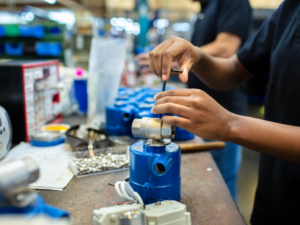If you or a loved one were hurt due to a dangerous or defective product, call a product liability lawyer at Munley Law.
For 65 years, Munley Law has represented victims in their most complex personal injury claims. Our experienced product liability lawyers have been named among the Best Lawyers in America, selected to Pennsylvania Super Lawyers, and are board-certified by the National Board of Trial Advocacy. Partners Marion Munley and Daniel Munley have both been named as Lawyers of the Year for Product Liability, and all our partners have the highest ratings from Martindale-Hubbell.
As one of the best personal injury law firms in the nation, we front all case costs and work with top engineers, product specialists, and medical experts to prove the defect and pursue the maximum compensation available. Over the last 6 decades, we have achieved over $1 billion in settlements and verdicts for personal injury victims across the United States.
To schedule a no-obligation, free consultation, call the product liability lawyers of Munley Law today.
$32 Million Wrongful Death
$26 Million Truck Accident
$20 Million Commercial Vehicle Accident
$17.5 Million Car Accident
$4.4 Million Settelement reached for Car Accident case.
$12 Million Work Injury
$11 Million Truck Accident
$9 Million Truck Accident
$8 Million Truck Accident
$8 Million Truck Accident
$7.5 Million Auto Accident
$6.9 Million Garbage Truck Accident
$6.5 Million Traumatic Brain Injury
What Is Product Liability?
 Product liability refers to a personal injury claim in which manufacturers, distributors, and retailers are held responsible for any damages caused by their products to consumers. While each state has its own product liability laws, some aspects of most legislation remain the same. These elements include:
Product liability refers to a personal injury claim in which manufacturers, distributors, and retailers are held responsible for any damages caused by their products to consumers. While each state has its own product liability laws, some aspects of most legislation remain the same. These elements include:
- The defendant may be the defective product’s designer, manufacturer, or retailer.
- To have a product liability claim, you or a loved one must have been injured by the defective product and suffered damages. These may include physical harm or property damage. However, you did not have to purchase the item—it could have been borrowed or gifted, and product liability law still protects you.
Product liability law differs in the type of claim you may make. Depending on your jurisdiction, your product liability claim may be based on negligence, strict liability, or breach of warranty.
- Negligence holds the designer, manufacturer, or seller responsible when the product fails to meet safety standards and causes harm. This can also include inadequate warnings of potential harm.
- Strict liability holds the designer, manufacturer, or seller responsible for defective products even if they did not know of the defects or did not intend to harm consumers.
- Breach of warranty holds the designers, manufacturer, or seller at fault for products that do not meet the warranty terms, do not work as intended, or cause harm.
Because federal laws do not cover product liability claims, victims must work with a product liability attorney to navigate the complex process of filing a claim.
Speak with a product liability lawyer today.
What Are Common Types of Defective Product Cases?
- Design defects occur when a product’s design is overly dangerous. This means that even if the product was produced correctly, its design is still likely to cause harm to consumers. A common example of a design defect is a mechanical error on a car part. To establish a design defect claim for product liability, the victim must show that another design alternative would have been safer.
- A manufacturing defect occurs when a flaw occurs in the production of the product. The design was likely safe, but the consumer would suffer harm when the error occurred in all or just a few items.
- Marketing defects occur when a product does not contain adequate safety warnings or instructions or is not properly labeled for consumer use. Unlike a design defect or manufacturing defect, marketing defects do not necessarily mean there was anything wrong with the product; rather, they suggest that consumers suffered harm because they were unaware of the dangers or specific uses of the product. Marketing defects can still be just as dangerous as manufacturing or design flaws.
- Failure to warn falls under the umbrella of marketing defects in many cases. Often, failure to warn claims revolve around the potential safety hazards of using the product or misusing the product. These notices and labels are meant to warn consumers of the risks; yet, many defenses to failure to warn claims are that the consumer should have known some of the obvious dangers, such as that a hair dryer may cause electric shock if it comes in contact with water.
- The Risk-Utility Test asks if the product’s use outweighs its risks. Under the test, a product is defective if a “reasonable person” would say that the severity of harm the product can cause outweighs the cost of taking precautions.
- The Consumer Expectation Test determines if the product defect is what consumers would ordinarily expect of the product and asks if the product’s danger was known to the average consumer.
Schedule a free consultation with a defective product lawyer.
How Do You Prove Liability in a Defective Product Case?
 To have a product liability case and establish liability, you must prove that the product was defective and that the defect caused your injuries. A few things to note when establishing liability in a product defect claim include:
To have a product liability case and establish liability, you must prove that the product was defective and that the defect caused your injuries. A few things to note when establishing liability in a product defect claim include:
- What type of defect exists?
- Is there causation? Is there a direct connection between the defect and your injuries?
- Did you suffer injuries or actual damages?
- Were you using the product as a reasonable person would–i.e., exercising reasonable care?
- Is your claim for negligence or under strict liability against the manufacturer or seller?
Establishing liability can be challenging, but our personal injury lawyers can help by collecting evidence, reviewing your medical records, documenting property damage, etc. From there, you can prove the type of product liability claim you have and what legal claim you will make.
What Injuries Do Defective Products Cause?
Defective products can cause mild to severe injuries, including physical harm, emotional trauma, and, in severe cases, even death. According to the National Safety Council (NSC), millions of people visit hospital emergency departments yearly due to injuries caused by defective products. In 2024 alone, an estimated 15.1 million people sought medical attention for an injury related to a consumer product.
Dangers of defective products include:
- Cuts, burns, broken bones
- Traumatic brain injuries (TBI)
- Emotional trauma, like anxiety, depression, and post-traumatic stress disorder
- Financial losses like medical bills, lost wages, and property damage
- Fear or mistrust of using a similar product again
- Wrongful death
Recent consumer safety analyses paint an even clearer picture of how dangerous faulty goods can be. According to an analysis of data from the Consumer Product Safety Commission by the U.S. Public Interest Research Group (U.S. PIRG) Education Fund , products that were later recalled were connected to 869 reported injuries and 15 deaths in 2024. Regulators announced 305 recalls that year for items ranging from tools to toys to household electronics, and more than 560 fires or other thermal events were documented before those products were removed from the market. Investigators also noted that 16 recalled products were tied to ten or more injuries, showing how quickly a defect can escalate into a widespread hazard.
Defective products affect every corner of the consumer marketplace. Recent data shows that 81 sports and recreational products were recalled in 2024, often due to defects that caused impact injuries or falls. Beauty, personal care, and hygiene products are also frequently flagged for safety issues, particularly when consumers report severe skin reactions or other unexpected harm.
Children are especially vulnerable to defective household products. In 2023, around 100 children’s items were recalled across the United States, and more than eighty million individual units were returned to manufacturers. These recalls followed reports of children choking, falling, getting burned, or suffering other serious injuries due to unsafe designs or hidden defects.
If you or a loved one suffered serious injuries due to a defective product, you need an experienced product liability attorney. The personal injury lawyers of Munley Law can help you file a claim, establish if the manufacturer or seller was strictly liable or negligent, and secure the financial compensation you need to recover.
How Do You File a Product Liability Claim?
 To file a product liability claim, it is in your best interest to seek out an experienced product liability lawyer. This ensures that you file your claim properly, adhere to deadlines, and understand every step of the legal process.
To file a product liability claim, it is in your best interest to seek out an experienced product liability lawyer. This ensures that you file your claim properly, adhere to deadlines, and understand every step of the legal process.
Speak with a product liability lawyer today.
The Role of a Product Liability Lawyer
- Guide you through the product liability process
- Determine who is responsible for your harm
- Mitigate your negligence if there is a question you shared fault
- Help you file a claim with the insurance companies
If a settlement cannot be reached, your lawyer will help you fight against the liable parties in court.
What Compensation Can You Recover in a Product Liability Lawsuit?
Why Choose Munley Law for Your Product Liability Claim
Our team is nationally recognized for its work on behalf of injury victims. Partners Marion Munley and Daniel Munley have both been named as Best Lawyers’ Lawyer of the Year for Product Liability, and all five partners are named to Lawdragon’s list of the 500 Leading Plaintiff Consumer Lawyers in America. All of our partners have also been named among the Top 100 Trial Lawyers in Pennsylvania by the National Trial Lawyers Association and have earned AV Preeminent Ratings from Martindale-Hubbell, which is their highest peer-review rating.









